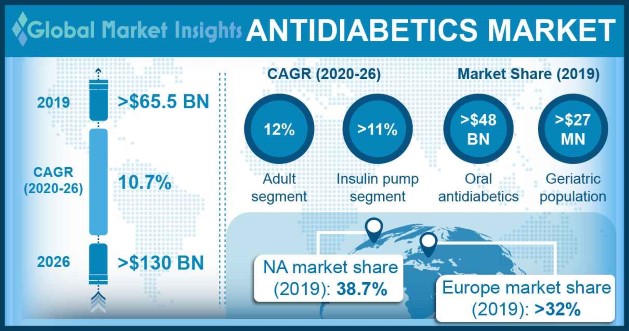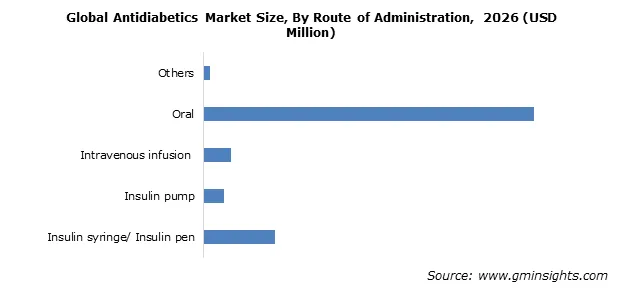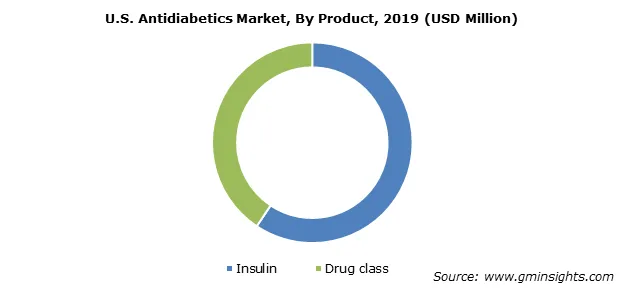Summary
Table of Content

Antidiabetics Market
Get a free sample of this report
Form submitted successfully!
Error submitting form. Please try again.
Thank you!
Your inquiry has been received. Our team will reach out to you with the required details via email. To ensure that you don't miss their response, kindly remember to check your spam folder as well!

Request Sectional Data
Thank you!
Your inquiry has been received. Our team will reach out to you with the required details via email. To ensure that you don't miss their response, kindly remember to check your spam folder as well!
Form submitted successfully!
Error submitting form. Please try again.
Antidiabetics Market Size
Antidiabetics Market size was USD 65.5 billion in 2019 and will grow at a CAGR of 10.7% from 2020 to 2026.

To get key market trends
Increasing prevalence of diabetes across the globe will stimulate the market potential for antidiabetics drugs during forecast period. Need for effective treatment with low side effects will result into increasing R&D spending by pharmaceutical firms for drug development. Thus, escalating demand and adoption of antidiabetic drugs in developing as well as developed nations will boost the market growth in the upcoming period.
Antidiabetics Market Report Attributes
| Key Takeaway | Details |
|---|---|
| Market Size & Growth | |
| Base Year | 2019 |
| Market Size in 2019 | USD 66.7 Billion |
| Forecast Period 2020 to 2026 CAGR | 10.7% |
| Market Size in 2026 | USD 135.9 Billion |
| Key Market Trends | |
| Growth Drivers |
|
| Pitfalls & Challenges |
|
What are the growth opportunities in this market?
Antidiabetics Market Analysis
According to the European Society of Cardiology, diabetic population is estimated to reach at 628.6 million by 2045. Management of diabetes requires timely intervention and medication throughout the patients lifetime due to lack of curative drugs. Advancement in antidiabetic drugs has resulted into increased success rates and minimized complications.
For instance, various new drugs including dipeptidyl peptidase-4 inhibitors, selective sodium glucose cotransporter 2 inhibitors and unique peroxisome proliferator-activated receptor agonists are in development stages. Introduction of new mechanisms have increased opportunities for combination therapies. Hence, public and organizational efforts to innovate in diabetes drugs space will impel the market size in near future.
However, considerable cost of insulin may limit antidiabetics market growth upto some extent in developing countries.
Insulin segment is further segmented as rapid acting analog, long acting analog, premixed insulin, short acting analog, intermediate acting insulin. Drug class is sub classified into alpha glucosidase inhibitors, biguanides, sulphonylureas, GLP-1 (Glucagon like peptide) agonists, DPP-IV (Dipeptidyl Peptidase) inhibitors, Meglitinides, SGLT-II (Sodium Glucose Transport Proteins) inhibitors and thiazolidinedione.
Insulin market constituted significant market share in 2019 and is expected to proceed at lucrative 12.4% CAGR. Introduction of short-acting analog has enhanced its post-prandial glucose-controlling ability in both type 1 and type 2 diabetic patients. Furthermore, with increase in type-2 diabetic patient pool, the segment will witness unprecedented growth during analysis period.
Geriatric population segment held over USD 27 million revenue in 2019. According to the European Society of Cardiology, among the total disease burden approximately 39.7% was due to population growth and ageing. Upsurge in geriatric population has contributed to significant diabetes burden.
With advancing age, prevalence of type 2 diabetes increases along with escalated risk of coronary heart diseases, vascular diseases and stroke. Older diabetes patients are exposed to high risk of sarcopenia and physical disability. Thus, in order to prevent comorbidities coupled with expanding baby boomers globally, the adoption of diabetes drugs in geriatric population will rise in the future.

Learn more about the key segments shaping this market
Insulin pump segment is forecasted to progress at over 11% CAGR during the forecast years. Robust growth is primarily attributed to preference for insulin pumps due to its advantages. It offers reduced episodes of severe glycemic conditions with less glucose variability. Also, ability of pumps to store information that can be further analysed and used in treatment planning will boost the segment revenue.

Learn more about the key segments shaping this market
North America constituted 38.7% market share in 2019 and is expected witness robust growth rate in the forthcoming years. According to the American Diabetes Association, approximately 34.2 million Americans were living with diabetes in 2018. About 88 million people had prediabetes in the region.
U.S. antidiabetics market share will grow at 10.3% CAGR during the analysis period. increasing number in pediatric diabetes patients will drive the regional growth. Also, several established drug manufacturers have high penetration in the U.S. antidiabetics industry. Furthermore, increasing need for diabetes management among COVID-19 patients suffering from comorbidities will expand the market demand.
Antidiabetics Market Share
Some of the prominent business players operating in the antidiabetics industry share include:
- AstraZeneca
- Novartis AG
- Johnson & Johnson
- Merck & Co. Inc
- Pfizer
- Sanofi
These market players are adopting various inorganic growth strategies to increase market share and achieve competitive advantage.
Some of the recent industry developments:
- In December 2019, Mankind Pharmaceuticals signed collaborative marketing agreement with Glenmark Pharmaceuticals to market remoglifozin, an antidiabetic drug, in India. This has allowed both the firms to expand their business in Asia Pacific region.
- In February 2018, Cipla collaborated with Novartis and Johnson & Johnson to market their anti-diabetics drugs. This collaboration has led to business expansion of the firm thereby strengthening its market position.
The antidiabetics market research report includes an in-depth coverage of the industry with estimates & forecast in terms of revenue in USD from 2015 to 2026 for the following segments:
By Product
- Insulin
- Rapid acting analog
- Long acting analog
- Premixed insulin
- Short acting analog
- Intermediate acting insulin
- Drug class
- Alpha glucosidase inhibitors
- Biguanides
- Sulphonylureas
- GLP-1 (Glucagon like peptide) agonists
- DPP-IV (Dipeptidyl Peptidase) inhibitors
- Meglitinides
- SGLT-II (Sodium Glucose Transport Proteins) inhibitors
- Thiazolidinedione
The above information is provided for the following regions and countries:
North America
- U.S.
- Canada
Europe
- Germany
- UK
- France
- Italy
- Spain
Asia Pacific
- Japan
- China
- India
- Australia
Latin America
- Brazil
- Mexico
Middle East & Africa
- South Africa
- Saudi Arabia
Frequently Asked Question(FAQ) :
At what CAGR will the insulin pump segment grow during next few years?
Insulin pump segment is forecast to progress at over 11% CAGR during the forecast years.
How much size did the global antidiabetics market register in 2019?
The market size of antidiabetics exceeded USD 65.5 million in 2019.
How much will the antidiabetics industry share grow during the forecast timeline?
The industry share of antidiabetics is expected to witness growth at over 10.7% CAGR from 2020 to 2026.
How much growth is expected in U.S. antidiabetics market through 2026?
U.S. market will grow at 10.3% CAGR through 2026, says this GMI report.
What are the growth estimations for insulin market up to 2026?
Insulin market constituted significant industry share in 2019 and is expected to proceed at 12.4% CAGR up to 2026.
Which are the top antidiabetics market players?
Some of the prominent business players operating in the antidiabetics industry include AstraZeneca, Novartis AG, Johnson & Johnson, Merck & Co. Inc., Pfizer and Sanofi.
Antidiabetics Market Scope
Related Reports


